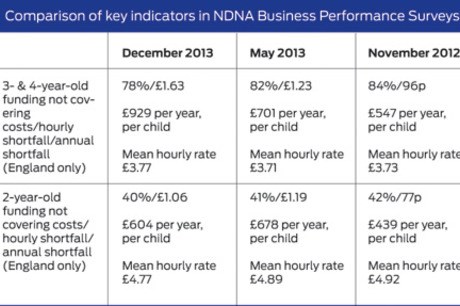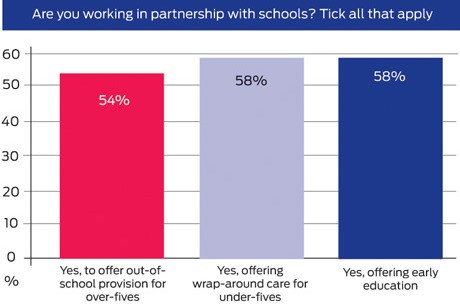Funding shortfalls burn a bigger hole in nursery pockets
Catherine Gaunt
Monday, February 24, 2014
Providing early education places for three- and four-year-olds is leaving nurseries nearly twice as much out of pocket than a year ago, a new survey suggests.

Nearly eight in ten nurseries that took part in the National Day Nurseries Association (NDNA) survey say the funding they receive from their local authority does not cover the cost of providing the places - and they are losing, on average, £929 a year per child (see table). This compares with a loss of £547 per year per child in November 2012.
The 'insight report' survey, which is supported by insurance broker Pound Gates and Nursery World, provides a snapshot of the state of the private and voluntary nursery sector at the end of December 2013. Results show that some nurseries are receiving 'pocket money' amounts of funding per hour, with the lowest amount recorded as £2.80 per hour per child.
Of those providing places for disadvantaged two-year-olds, four in ten said they were left with a funding shortfall. The average hourly rate for two-year-old funding is £1 more than that provided for three- and four-year-olds. The NDNA says some local authorities are squeezing the hourly rate despite rising inflation, business rates and utility bills, and that the result will be increased childcare costs for parents as nurseries struggle to cover the losses.
Responses were received from 306 nurseries in England, with just under three-quarters of respondents owners of single nursery sites.
Surveys were also carried out in Scotland and Wales.
NDNA chief executive Purnima Tanuku said, 'For years, NDNA has lobbied to close the gap on funded free places. Successive governments have promised a review and failed to deliver.
'The survey results show some nurseries were receiving "pocket money" amounts of funding per hour to deliver high-quality childcare. The recent Government announcements also point to PVI nurseries being further squeezed and having to rely on the most expensive part of the childcare sector, nought- to two-year-old provision.'

The report's recommendations
Funding The hourly rate must cover the cost of providing the funded place. The funding system must be reformed and the money ring-fenced so the full amount reaches the front line.
Urgent action The funding gap is universal and growing. Tax credits, vouchers and free nursery hours should be combined into one single pot of funding that goes direct to the provider.
Business burdens Private nurseries provide a public service, and as such should be treated as state provision, with the Government supporting the PVI sector's overheads and making nurseries zero-rated for VAT.
Free school meals The funding should follow the child, so that whatever nursery parents choose, extra money for a free school meal is provided. Not providing a free school meal in PVI settings is unfair.
Partnerships with schools See table below.
Workforce Prioritised investment is needed to build a high-quality workforce.
Ofsted A national stakeholder group should be set up. There needs to be a clear and fair policy on complaint-driven inspections with the history of the complaint considered only when it is relevant to the current practice.
Survey results
Occupancy
Occupancy is, on average, 75 per cent. This is lower than the 80 per cent reported in May 2013, but can be attributed to a seasonal variation: occupancy falls in September when children go to school, and rises again in the spring as more start nursery.
The average is slightly higher than that identified by providers in the Department for Education's childcare providers finance survey as the level needed to achieve a surplus, which was put at 71 per cent. However, comments show that occupancy is driven by more free places. This raises concerns about sustainability, given the ongoing problem of inadequate funding.
Parents' use of childcare
There is a move away from parents using full-time childcare, with 67 per cent of respondents stating they took more part-time children and 43 per cent that parents were using more informal childcare. The NDNA said this chimed with feedback from nurseries that parents were increasingly taking action to cut back on childcare costs.
The top five challenges faced by nurseries:
- Increase in cost of utilities
- Achieving a profit
- Increasing staff wages
- Cost of business rates
- Delivering a sustainable free nursery education offer.
- Business confidence
There has been a slight rise in nurseries' confidence in their business performance for the next 12 months. Twenty-eight per cent said they intend to expand, with reasons including to provide more places for two-year-olds, to offer Saturday or out-of-school care, and for new development.
One nursery owner said they were expanding to buy 'a modular building to cope with the demand for two-year-olds and their families', while another said they were 'increasing floor space at one setting and looking for possible purchases'.
Funded places
Seventy-four per cent of nurseries offer free places for two-year-olds, with 91 per cent offering three-year-old places, and 84 per cent four-year-old places.
Fewer reported funding shortfalls for two-year-olds. However, 40 per cent said the funding did not cover their costs, with an average shortfall of £1.06 per hour per child, equivalent to a loss of £604 per child per year.
Just over four in ten nurseries said they intended to increase their provision of free places for twos, with just over half saying they intended to keep the same number of places on offer.
Nurseries were asked what support they would like to see from their local authority. Comments included: 'All support has pretty much been withdrawn, courses are now charged for and it is almost impossible to get any advice regarding specific children and their needs.'
One called for an 'increase in funding for funded places'; and another wanted 'increased visits - ours have been cut due to funding - and more grants made available to improve facilities and resources'.
Inspections
Just over four in ten nurseries said they had been inspected by Ofsted since the new framework started in September 2012. Forty-nine per cent of these were complaint-driven.
Around a quarter of nurseries had been downgraded following an inspection, with a similar proportion complaining about their grading. Eighty-nine per cent of nurseries were graded good or outstanding.
Comments included: 'We complained, but there was no change, just a few sentences reworded.' Another said: 'I did not make a complaint for fear of our grade being dropped further.'
Planning a change
Nurseries were asked if they planned to change their offering in the next six months and, if so, how.
A majority of nurseries (68 per cent) said they intended to offer more flexibility. Thirty-one per cent plan to extend their opening hours, and 22 per cent to offer out-of-school care.
WORKING WITH SCHOOLS
 Four in ten of the nurseries in the survey were working with schools. Fifty-eight per cent were offering wraparound care for under-fives, and a similar number early education.
Four in ten of the nurseries in the survey were working with schools. Fifty-eight per cent were offering wraparound care for under-fives, and a similar number early education.
However, the majority - 78 per cent - were not offering the service on the school site but at their own premises.
Comments from nurseries included:
'We provide flexible wraparound care and have extended this to include more schools as parents have struggled to get places at their preferred/nearest school.'
'We work very closely with the local school, particularly around transition for children with additional needs.'
'We work with schools through transition plans/offering support at this time, inviting schools into the setting and vice versa.'
The NDNA survey found there is spare capacity in nurseries to take more two-year-olds with, on average, a fifth of available places empty. Nurseries offer, on average, only 11 places for two-year-olds, but have the facilities and skilled staff to offer more.
Commenting, Purnima Tanuku says, 'Instead of encouraging schools to take more two-year-olds, funding should be targeted at PVI provision to cover the actual cost of the place.'




